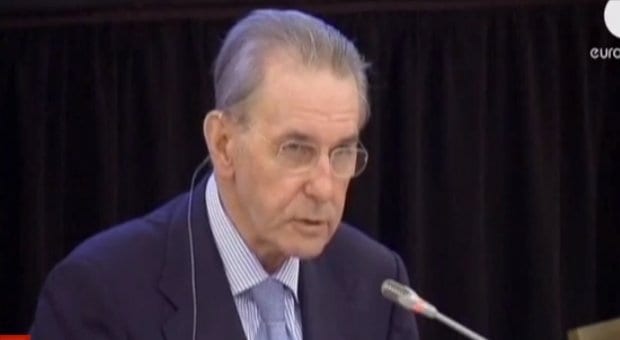
Russian lawmaker Vitaly Milonov. Credit: Euronews
The International Olympic Committee (IOC) has reportedly told Gay Star News (GSN) that athletes who flout its charter rules against propaganda by supporting gay rights at the Sochi Games next year may be punished.
Rule 50 of the IOC’s charter says demonstrations or political, religious or racial propaganda are not permitted in any Olympic sites, venues or other areas. Violations of the rule could lead to “disqualification or withdrawal of the accreditation of the person concerned.”
Gay speedskater Blake Skjellerup of New Zealand is one athlete who says he intends to show support for Russia’s queer community by wearing a rainbow pin in Sochi.
When asked if the IOC plans to establish a safe space, or Pride House, for queer athletes, spectators and others, a Games spokesperson also referred GSN to Rule 50.
“Regarding your suggestions, the IOC has a clear rule laid out in the Olympic Charter (Rule 50) which states that the venues of the Olympic Games are not a place for proactive political or religious demonstration. This rule has been in place for many years and applied when necessary. In any case, the IOC would treat each case individually and take a sensible approach depending on what was said or done.”
For his part, IOC president Jacques Rogge has said that the charter is very clear. “It says that sport is a human right, and it should be available to all regardless of race, sex or sexual orientation . . . so our position is very clear,” he says.
A Euronews video report quotes Russian lawmaker Vitaly Milonov as saying nobody has “ever got arrested for his sexual orientation here in Russia.”
“Don’t succumb to that hysteria that perverts across Europe have started,” Milonov said before TV cameras. “Our highest-paid artists have a nontraditional sexual orientation and they’ve not faced any discrimination.”
Meanwhile, as the rhetoric for and against a boycott of the Sochi Games continues to ramp up, Russia’s Interior Ministry, which oversees the police force, confirmed today, Aug 13, that the country’s law against “propaganda of nontraditional sexual relations among minors,” signed by President Vladimir Putin, will be enforced during the February 2014 Winter Games, RIA Novosti reports.
According to National Public Radio (NPR), the law doesn’t define what is meant by nontraditional relations, but it quotes one of the law’s authors, Yelena Mizulina, as saying that “men with men, women with women, bisexuality and being transgender” qualify under that rubric.
The law’s definition of “propaganda” is also vague, NPR adds. “Anyone who distributes information with the ‘intention’ of persuading minors that nontraditional sexual relationships are ‘attractive’ or ‘interesting,’ or even ‘socially equivalent to traditional relationships’ could be accused of breaking the law.”
The scale of punishment for those who violate the bill’s measures varies. Individuals can be fined up to 5,000 rubles ($125-156), legal entities up to one million rubles ($15,500-31,000) and suspension of their activities, and internet promotion up to 100,000 rubles ($1,550-3,100).
Foreigners who violate the law face the prospect of 15 days in prison and deportation.
In an interview with The New York Times, 39-year-old freelance journalist Aleksandr Smirnov says he was forced to quit his job in the press office of a Moscow deputy mayor after he appeared in a magazine with other gay Muscovites.
“If you ask gays in Moscow whether they were attacked, or insulted, practically everyone will admit that it happened to him,” he said. “We are just at the very, very beginning of the movement for the rights of gays. And this new law, you know, it seals our mouths and ties our hands and feet.”


 Why you can trust Xtra
Why you can trust Xtra


